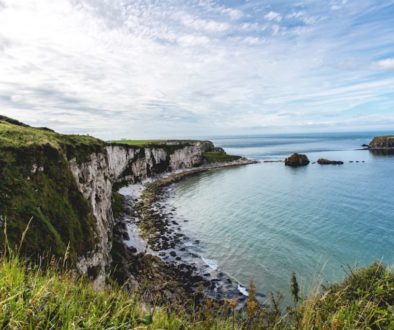Revitalising a changing coastline
WHAT is being done to address the complex social, economic and environmental issues faced by our coastal communities? Jessica Sellick and Ivan Annibal investigate.
At the interface between land and sea, coastlines provide vital resources for wildlife, the economy and human health and well-being. They also provide a vivid juxtaposition of natural and artificial environments: from weathering processes and shoreline erosion to the building of sea walls. But our coastline and seaside settlements are facing multiple pressures.
A popular television programme ‘Coast‘ takes viewers on a tour around the British Isles, from climbing the sea cliffs of Ireland’s Atlantic west coast to experiencing the mysterious ‘Singing Sands’ of Wales, and from taking a boat journey coast to coast on a waterway cut through the Scottish Highlands, to riding on a steam train to the English Riviera. But amid the stunning landscapes, ancient monuments, pathways and sheltered harbours that the programme portrays, our coasts and coastal communities face a range of challenges.
The Select Committee Inquiry into Coastal Towns (2007), for example, identified issues around physical isolation (poor transport connections), deprivation levels, the inward migration of older people, the high level of transience, the outward migration of young people, poor quality housing and the seasonality and stratified nature of coastal economies. Although many of these issues are shared by coastal settlements, adopting a ‘one size fits all’ approach to tackling them is unlikely to work – compare and contrast Brighton or Bournemouth (buoyant) with say Margate or Clacton (marked by their relative deprivation).
What, then, can be done to address some of these disparate but interconnected issues? We offer three points.
Firstly, while coasts are a fundamental part of our identity as an Island nation, there is a divergence between the economic roles of coastal settlements. In England economic power is based principally in non-coastal settlements (e.g. London, Birmingham, Manchester, Leeds and Sheffield) with many coastal settlements suffering from the effects of peripherality. In the rest of the UK, however (for reasons of historical geography) many of the principal settlements are coastal – in Scotland: Edinburgh, Dundee, Aberdeen and Inverness; in Wales: Swansea, Cardiff and Aberystwyth; and in Northern Ireland: Belfast and Derry.
Despite the peripherality of coastal settlements in England, according to the Coastal Communities Alliance, there are around 3.5 million people living in or near 113 seaside resorts spread around 6,250 miles of coastline. These residents and resorts tend to fall under two categories.
The first category ‘Rural Settlements’ are places often perceived to be “on the edge”, with a 180 degree hinterland. These settlements are often remote from major centres of population and have highly seasonal economies, frequently linked to tourism. In many places a full understanding of the dynamics of a coastal economy of this type can best be appreciated in the context of its visitor hinterland. The tourism economy of the Lincolnshire coast, for example, is best understood in the context of socio-economic characteristics of Leicester, Nottingham and Derby from where most of its visitors come. A number of these coastal settlements also have significant issues to tackle around flood risk and coastal erosion which affect their long term viability.
The second category, ‘Cities by the Sea’, is where the coastal component is a limited aspect of their economic rationale. For example, Bournemouth is characterised economically by its role as a financial services centre; Southend is a vibrant economic ‘satellite’ of London; and Newcastle is an important hub and administrative centre for the North East. It is those coastal settlements that fall within the first (rural) category that are particularly vulnerable. Credit ratings company ‘Experian’ has ranked 326 local authorities in England by key poverty indicators, from child poverty to the risk of long-term unemployment. The resultant maps show more than a simple urban bias and identify a number of places –a broad central swathe running from the Lincolnshire coast right to the Mersey across rural and urban local authorities – that are vulnerable. Indeed, the data reveals that being on the coast outside of the South East puts you in a particularly vulnerable position.
Secondly, recognising that coastal settlements are diverse on the one hand and that they face a generic set of problems on the other hand, has not led to a joined-up ‘coastal’ category or policy approach in the same way that has taken place for urban and rural categories. There is still no overarching national policy framework for coastal settlements or communities yet they remain affected by a range of policies administered by many Government departments.
The Department for Environment, Food and Rural Affairs (Defra) leads on coastal policy, but the focus here remains upon spatial planning for the sea and coast (e.g. The National Flood and Coastal Erosion Risk Management Strategy). The Department for Communities and Local Government (CLG) published a ‘Strategy for Seaside Success; securing the future of seaside economies‘ in 2010. Whilst Regional Development Agencies and the British Urban Regeneration Association took up coastal issues – they are now defunct and much of their work remains archived on websites. There is something even more poignant about local authorities and other public sector bodies that are grappling with funding reductions and diminishing resources.
The exception to this response remains the Coastal Communities Alliance (CCA). The CCA has a current membership of over 40 coastal Local Authorities, the Local Government Association’s Coastal Special Interest Group (SIG); British Resorts and Destination Association (BRADA) and Lincolnshire County Council. The CCA believes that new thinking on addressing deprivation is required to enhance the quality of life for coastal residents, reduce public service costs and to raise the status of popular seaside towns. Many of these themes are taken up in the CCA’s ‘coastal regeneration in English resorts‘ publication.
Thirdly, in practice, the CCA reminds us that whilst buckets and spades and the tourism industry are all important features of the coast, we need to think about the needs and aspirations of the people who live and work there too. In terms of tourism the CLG Strategy for Seaside Success found the industry in England and Wales directly supported approximately 210,000 jobs and a large number of additional jobs indirectly through the supply chain. The recent Government funded ‘staycation campaign‘; launched by Visit England in March 2012 features Stephen Fry, Julie Walters, Rupert Grant and Downton Abbey’s Michelle Dockery all extolling the intrinsic worth of a domestic holiday. It is the latest in a long line of senitmental responses to hoildays which condition our image of the coast stretching back to Cliff Richard and “Summer Holiday” although in the film he chooses to go abroad.
Many of the resorts featured in these programmes and documents are grappling with issues around seasonality and a local economy confined to a few sectors (which in itself presents challenges when policy-makers focus upon creating private sector jobs). They evoke an image of coast more resonant with Morrissey’s lament “Everyday is like Sunday” than Skegness’s theme tune: “Fun, fun, fun in the sun, sun, sun”.
There are, however, bottom-up, on-the-ground examples that have attempted to overcome some of these challenges. For example, the Xsite Skate Park in Skegness seeks to raise the aspirations of young people, providing an indoor and outdoor extreme sports facility, hosting tournaments, a children’s club, and outreach programme and as an Arts and Technology Hub. There are also opportunities presented by European Union policies – Rose Regeneration consulted fishing communities in Cornwall to develop a strategy for the Cornwall Fisheries Local Action Group (FLAG). The document highlighted a range of priorities around improving infrastructure, training and skills, conservation and heritage for coastal communities. In March 2012, over £1.13 million of European Fisheries Fund (EFF) money was secured to deliver projects in fishing communities in Cornwall and the Isles of Scilly. At a national level, and also in March 2012, the Coastal Communities Fund was launched. Administered by the Big Lottery Fund, the funding is designed to support the economic development of UK coastal communities by promoting sustainable economic growth and jobs. The Government has committed £23.7 million to support this funding stream in 2012-2013.
The English coastline continues to change – shaped by a variety of natural features (islands, bays, headlands and peninsulas) and human activities. Tackling the deprivation and disadvantage of coastal settlements (alongside recognising their achievements and opportunities) depends upon recognising this interface between physical and human processes and their connections past, present and future. In the words of Isaac Newton, ‘I do not know what I may appear to the world; but to myself I seem to have been only like a boy playing on the seashore, and diverting myself in now and then finding a smoother pebble or a prettier shell than ordinary, whilst the great ocean of truth lay all undiscovered before me’.
Rose Regeneration has particular empathy and enthusiasm for coastal issues; believing this to be a frequently neglected area of public policy with an often misunderstood context. Our work in coastal places includes a project developing good practice case studies on economic well-being, a community development & stakeholder engagement exercise to develop a strategy for the Cornwall & Isles of Scilly Fisheries Local Action Group and contributing to the Coastal Regeneration Handbook. Website: www.roseregeneration.co.uk Jessica can be contacted by email This email address is being protected from spambots. You need JavaScript enabled to view it.”>jessica.sellick@roseregeneration.co.uk or telephone 01522 521211.
This article is in memory of Patrick Browne, whose enthusiasm, commitment, experience and imagination was not only instrumental in the formation of the CCA and publication of the Coastal Regeneration handbook, but whose ideas for ‘doing small things better’ will continue to inform coastal regeneration activities.

